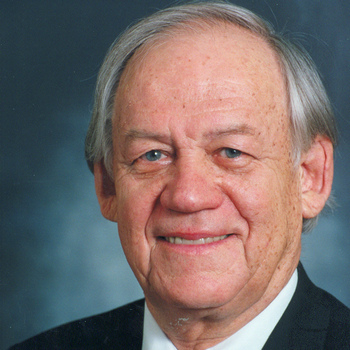DOCTOR OF COMMERCE (HONORIS CAUSA)
 Nicholas Everhardus Wiehahn was born in Mafeking and received his school education in Warrenton and Kimberley. After school he studied law at the University of the Orange Free State and obtained the degrees of BA LLB.
Nicholas Everhardus Wiehahn was born in Mafeking and received his school education in Warrenton and Kimberley. After school he studied law at the University of the Orange Free State and obtained the degrees of BA LLB.
At the beginning of 1967 he arrived on the Bird Street campus of UPE as a senior lecturer in Mercantile Law. In 1971 he was appointed as the first professor in Mercantile Law. It was within this vibrant academic atmosphere that he was able to explore the field of labour relations while researching his doctoral thesis on boycotts. He discovered that the legal aspects of the employeremployee relationship had not yet received the academic attention they deserved and by 1970 convinced his colleagues that it was imperative that an independent course in Labour Law be incorporated into the LLB programme. This made UPE the first university to introduce Labour law as a field of specialisation, to be followed by all other universities in due course.
Prof Wiehahn completed his LLD at Unisa in the meantime and continued to focus on the promotion of Labour Law as a discipline, emphasizing its crucial importance for the future of our country. The seventies were characterized by increasing labour unrest, a situation that was aggravated by the political situation in the country, which inter a/ia did not allow Blacks to unionise. Nic Wiehahn firmly believed that lasting industrial peace could only be achieved by recognising and regulating the Black trade union movement, but his opinions were viewed with distrust, if not outright animosity, by the powers that were.
However, several important role-players in business and government were beginning to realise that the current policies did not offer real solutions. After moving to Unisa in 1976 he was appointed as fulltime advisor to the Minister of Labour and a year later as the Chairman of a Commission of Inquiry into labour legislation in South Africa; this Commission became generally known, in and outside the borders of South Africa, as the Wiehahn Commission. This Commission worked tirelessly for a number of years and eventually produced a report that revolutionised labour relations in South Africa. The Commission's recommendations were acclaimed nationally and internationally and resulted in legislation which introduced a new era in employment law. Professor Wiehahn also became the first President of the Industrial Court and laid the foundations of a body of jurisprudence that soon gained recognition as one of the finest in the world. Nic Wiehahn can truly be regarded as the "father" of labour law in South Africa; without his pioneering contribution to this field, there is no doubt that the explosive labour scene would have erupted into violence, causing untold damage to the national economy.
Professor Wiehahn's mastery of the art of diplomacy and gentle persuasion was already apparent during his sojourn at UPE. Apart from being an accomplished researcher and an inspiring teacher, he also took a keen interest in student affairs and the University management. His ability to manage and defuse conflict led to his appointment as the first Dean of Students and subsequently also as member of the University Council. In a time characterized by conflict and tension between management and student structures, he could rely on the trust and support of all the stakeholders and managed to facilitate peaceful resolution of potentially destructive confrontations. He was inter-alia responsible for the establishment of a Student Forum and a Staff Council, both of which greatly contributed to the development of more harmonious relationships between the University management on the one hand, and staff and students on the other hand.
His influence was also felt in the business community where he was, amongst others, instrumental in the development of sound labour relations policies at all the big motor companies in the PE-Uitenhage area.
The University of Port Elizabeth is proud to honour NICHOLAS EVERHARDUS WIEHAHN for his contribution in elevating labour law to its rightful position in SA law, along with his numerous other contributions to society.